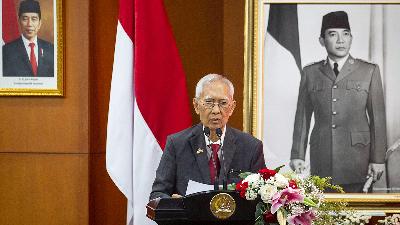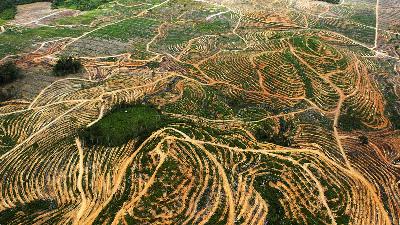The Illegal Gold Miner Scapegoats
Monday, October 7, 2024
Officials are all trying to avoid responsibility for illegal gold mining in protected forests. The dangers to the environment and to health are being ignored.
arsip tempo : 174493652488.

IN this nation, poor people are often victims of disasters, while at the same time being blamed for causing them. The tragedy that struck illegal gold miners in Rimbo Bukik Atok, Nagari Sungai Abu, Solok Regency, West Sumatra is one example. On September 26, around two dozen miners were buried under a landslide, and 13 of them died. After losing their lives, these illegal miners were still accused of triggering the disaster.
Instead of taking responsibility, officials tried to avoid blame. Solok Regent Akbar Ali, for example, said that the illegal mining was in a protected forest, which falls under the responsibility of the central government. Acting West Sumatra Governor Audy Joinaldy claimed that the gold mining was a matter for the central government, not the locals. These efforts to avoid responsibility clearly show the lack of concern as well as lack of understanding of officials about prevailing regulations.
Illegal gold mining should not only be a matter for the central government, but also the responsibility of local governments. As a result of the Job Creation Law and its derivative regulations, which changed the function of the integrated forest management system in the Ministry of Environment and Forestry, forest management is no longer effective. Previously, the centralized system monitored forests, but now it is more focused on assisting groups of forest farmers, meaning that their monitoring of illegal mining activities is increasingly ignored. However, leaving aside the problem of weak regulations, the central and regional governments should be more serious in coordination to prevent illegal gold mining as well as mitigating its negative impacts.
It is well known that illegal gold mining not only destroys forest ecosystems, but also pollutes the environment with mercury. The massive use of mercury in unauthorized mines leads to severe contamination and has the potential to cause a health crisis. The dark history of the Minamata tragedy in Japan in 1956, which was caused by mercury poisoning, should serve as a reminder. More than 1,700 people died there and tens of thousands suffered paralysis or damage to their nervous systems as a result of mercury contamination.
Indonesia has ratified the Minamata Convention through Law No. 11/2017. But the implementation in the field has been far from satisfactory. A 2013 study by the Agency for the Assessment and Application of Technology found that 195 tons of mercury were being released into the atmosphere every year from illegal mining. In West Sumatra, researchers from Andalas University showed that the level of mercury in the Batanghari River is above the permitted limit, threatening the health of people and water life.
The problem is often made more complicated by the practices of rent seekers. Around many illegal mines, there are officials who collude with rich illegal miners. An Andalas University investigation in Sijunjung and South Solok also discovered the involvement of officials in protecting illegal mining. This adds to the layers of corruption, which makes matters worse.
There is a need for proper law enforcement without compromise to eradicate illegal gold mining. The governments, both in the central and in the regions, must work together and take responsibility. There must be no more victims among ordinary people, or scapegoating resulting from the lack of concern or illegal involvement of officials.











